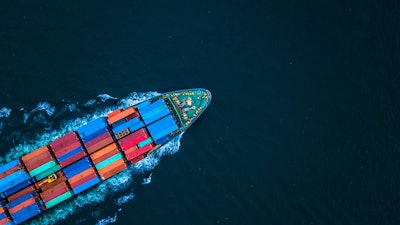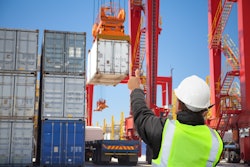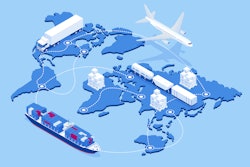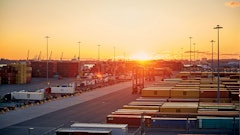
Pay attention to your news feed and you're likely to see ongoing updates and incidents of cargo ship attacks in the Red Sea. Regional conflict is at the heart of these attacks with Houthi rebels taking on commercial vessels. Declared as the 'Red Sea Crisis', urgent international and diplomatic intervention is a necessity moving forward to mitigate the risks for shippers and the economy.
As a result, major shipping companies are now diverting vessels, forcing them to take routes around the South African Cape of Good Hope and causing longer travel times. Because of this, delays and rising costs are causing disruptions to an economy we all know is already suffering from inflation.
Matthew Burgess, vice president of global ocean services at C.H. Robinson, says the pauses in transit and re-routing of vessels from the Suez Canal are already placing a strain on capacity globally – not only in the Red Sea. He explains that, while space limitations are most prominent on the Asia-Europe trade lane now, and are expected to continue for multiple weeks, we’re seeing the impact across other lanes as ocean carriers shift vessels to lanes with the highest shipping demand.
"To secure space in a competitive capacity market, booking as far in advance as possible for ocean freight will be key across all trade lanes. Currently, we’re recommending customers to book at least 3-4 weeks in advance. As vessels and containers are in transit longer, a shortage of empty containers and equipment in Asia will occur," says Burgess. "This will further increase delays as freight is stuck at origin until an empty container is available. When containers are in short supply, utilizing less-than-container load (LCL) ocean shipping is an option to consider. If you can’t secure a full 20 or 40-foot container, LCL helps keep some of your freight moving by securing space in a shared container."
While these are huge ripples being made to negatively affect the greater issue of economy and trade, direct worry centers around safety concerns for cargo shippers on the water. Recent alert from the U.S. Department of Transportation Maritime Administration (Marad) regarding attacks on merchant ships sailing near Yemen and Somalia is a stark reminder, according to Tony Pelli, practice director of security & resilience at BSI, to remain cautious while sailing cargo vessels in these waters.
"While the Israeli/Hamas conflict remains ongoing, it’s critical to be aware of its evolving risks in the region and potential impact on closely located waterways," says Pelli. "Safety is paramount and should not be compromised if avoidable. It’s recommended that ships with plans to travel in this region review its schedules, intended routes and budget to determine whether alternative paths to avoid these areas are viable as a safety precaution. For some, such as those utilizing the Suez Canal, these waters may be unavoidable and require additional safety precautions onboard. This will also increase insurance premiums, adding to the overall cost of transportation."
Identifying alternatives and building a “Plan B” is a consideration to make, says Gautam Jain, CEO at GoComet, and why equipping supply chains with digital technologies can help. "In this data-driven future, transparency and real-time information are the keys to weathering the storm and ensuring your goods reach their destination, no matter how the Red Sea's tides may turn," says Jain.
Additionally, the use of air freight and LCL ocean shipping can prevail as alternative options when shippers are feeling the most uncertain. Burgess says the cascade of disruptions across the supply chain is giving some shippers flashbacks to the COVID pandemic.
"Some shippers are already in survival mode with one goal on their mind: make sure my freight moves by whatever means possible. That’s where contingency plans come in. Keep in mind, a logistics provider with global scale and expertise to strategize and put those plans in motion is key to keep your freight moving during disruption. Traditional air freight is an obvious alternative, but contingency plans can also include a combination of sea and air solutions, expedited inland services, transloading when cargo arrives at port and LCL. The spot market will be a good indicator to monitor the industry-wide shift to other modes," says Burgess.
Taking steps to strategize planned movement through these waters is vital to keep personnel and cargo safe from harm. Reroutes should be used if at all possible and equipping shippers with safety precautions is required. Creating a "Plan B" for action which might include utilizing technology and data to enhance visibility and considering all the alternative transportation modes available can help shippers remain steadfast in an effort to keep everyone in the know, up to date and secure.


![Pros To Know 2026 [color]](https://img.sdcexec.com/mindful/acbm/workspaces/default/uploads/2025/08/prostoknow-2026-color.mduFvhpgMk.png?auto=format%2Ccompress&bg=fff&fill-color=fff&fit=fill&h=100&q=70&w=100)







![Pros To Know 2026 [color]](https://img.sdcexec.com/mindful/acbm/workspaces/default/uploads/2025/08/prostoknow-2026-color.mduFvhpgMk.png?ar=16%3A9&auto=format%2Ccompress&bg=fff&fill-color=fff&fit=fill&h=135&q=70&w=240)








